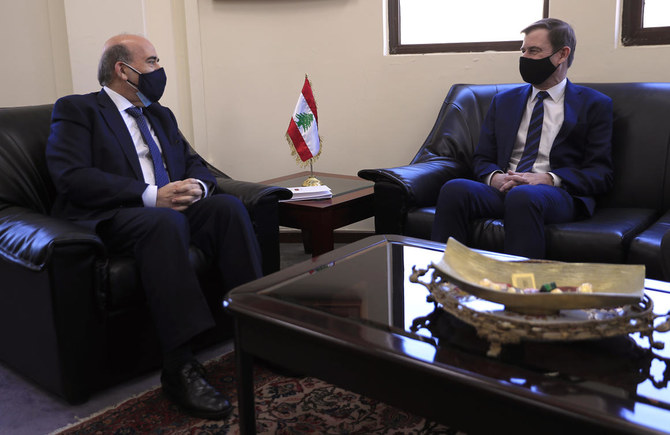
BEIRUT (AP) — A senior U.S. official warned Thursday that Lebanese politicians who continue to block reforms in the crisis-hit country could face punitive actions by Washington and its allies. U.S. undersecretary of state for political affairs David Hale did not provide details on the nature of the potential actions. But appeared to refer to reports that the United States and its allies may impose sanctions on Lebanese politicians in order to force them to end a monthslong political deadlock and start badly needed reforms to fight corruption.
by NAJIA HOUSSARI — arabnews.com — BEIRUT: A leading US diplomat has urged Lebanese officials to “show sufficient flexibility to form a new government capable of true and fundamental reform.” Visiting US Under Secretary of State for Political Affairs David Hale on Wednesday said that the urgently needed step offers “the only path out of this crisis.” But he added: “It is also only a first step. Sustained cooperation will be needed if we are going to see transparent reforms implemented.” Hale is on a two-day visit to Beirut at the request of US Secretary of State Antony Blinken to discuss Lebanon’s economic and political crisis. On the first day of his visit, Hale said: “The US and its international partners are greatly concerned with the failure here to advance the critical reform agenda long demanded by the Lebanese people.”
The diplomat and foreign specialist had previously visited Lebanon in December 2019 and August 2020. He said that “only little progress has been made regarding the long-overdue financial, economic and governance reforms, while millions of Lebanese endure mounting economic and social hardships on top of the pandemic. “This is the culmination of decades of mismanagement, corruption and failure of the Lebanese leaders to put the national interests as a priority.” Hale said: “The US and the international community are ready to help, but nothing meaningful can be done without a Lebanese partner.” Hale met Parliamentary Speaker Nabih Berri, Prime Minister-designate Saad Hariri, Progressive Socialist Party head Walid Jumblat and caretaker Foreign Minister Charbel Wehbe. He has also scheduled meetings with Lebanese opposition leaders. In a statement issued by the US Department of State, Hale expressed US concerns over the “deteriorating social and economic situation, and the political impasse that has contributed to this deterioration.” After the meeting, Wehbe said that Hale had outlined the new US administration’s approach to Middle East and Lebanese issues that “is closer to our vision.”
Hariri’s media adviser, Hussein Al-Wajh, told Arab News that Hale stressed the need for a government of independent specialists, as well as Washington’s readiness to help such a leadership and support Lebanon. On the final day of his visit, Hale is expected to discuss the maritime borders’ demarcation issue with President Michel Aoun and caretaker Prime Minister Hassan Diab. On the eve of Hale’s arrival in Lebanon, Aoun refused to sign a draft amendment expanding Lebanon’s maritime borders in the south, instead referring the decision to a Cabinet meeting on Tuesday. A written decision setting out Lebanon’s claim on the maritime boundaries has to be submitted to the UN, while Lebanon has also resumed indirect negotiations with Israel on the subject.
According to a political source, Aoun might be seeking to control negotiations with the US administration, which is sponsoring talks on the issue between Lebanon and Israel. Hariri will fly to Moscow on Thursday, where he will meet Russian President Vladimir Putin along with the Russian premier and foreign minister. Georges Chaaban, Hariri’s adviser for Russian affairs, said that the prime minister-designate will discuss Russia’s assistance in forming a government, addressing the economic crisis and securing COVID-19 vaccines.



